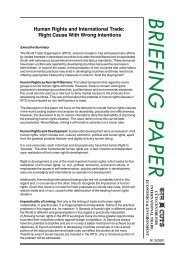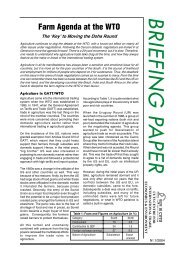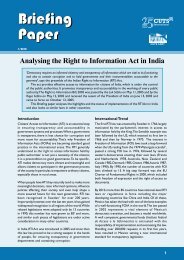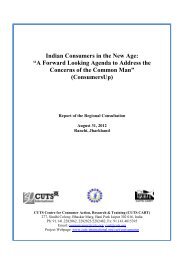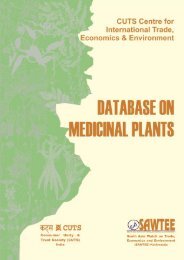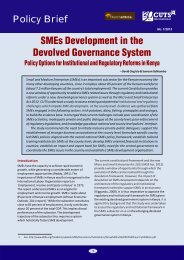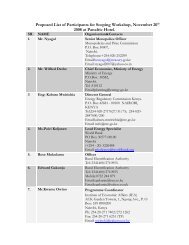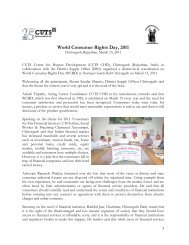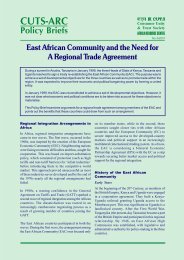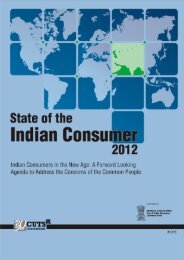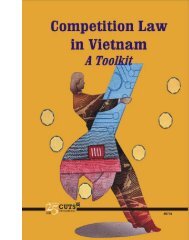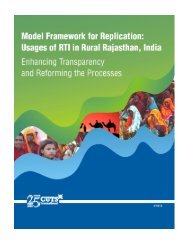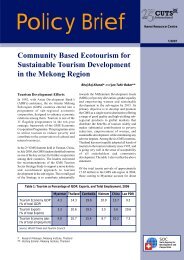Final Report - World Trade Organization
Final Report - World Trade Organization
Final Report - World Trade Organization
You also want an ePaper? Increase the reach of your titles
YUMPU automatically turns print PDFs into web optimized ePapers that Google loves.
In most of the 7-Up countries the levels of market<br />
concentration were very high in many industries when<br />
the competition law was introduced. In Pakistan,<br />
for example, a few families controlled a significant<br />
chunk of industrial assets and the average four-firm<br />
concentration ratio was found to be around 70 per<br />
cent for 82 industry groups. The situation was similar<br />
in India and South Africa where large conglomerates<br />
with interlocking ownership structures, cross-holdings<br />
etc. made the distribution of industrial assets very<br />
unequal. These ‘initial conditions’ may have tilted<br />
the balance in favour of the ‘structural’ focus.<br />
Overall, the working of the competition authorities in<br />
the 7-Up countries is based on the ‘structural’<br />
understanding of ‘competition’ efficiency, market<br />
power etc; the behavioural aspects though considered<br />
are not accorded primacy. With the emerging focus<br />
on ‘conduct’ in most developed countries, the<br />
competition authorities in developing countries may<br />
also need to change their criteria of assessment or<br />
use the gateways more often. 124 However, a<br />
movement from ‘structure’ to ‘conduct’ in the<br />
implementation of competition policy will require a<br />
significant increase in the capacity of the competition<br />
authority. This, however, is lacking in most developing<br />
countries, including the 7-Up countries, and will<br />
remain a challenge for developing countries with<br />
limited resources.<br />
4.3 Cross-Border Issues<br />
With the progressive opening up of their trade regimes<br />
developing countries as well as developed countries<br />
are now required to deal more and more with the<br />
influence of actions that take place or originate<br />
outside their borders. Their ability to deal with these<br />
cross-border competition concerns is therefore of<br />
vital importance to the level of competition in their<br />
domestic markets. As many other government<br />
policies (such as trade and investment or<br />
disinvestment policies) can influence the level of<br />
competition in a market, the competition authorities<br />
have to have adequate tools to deal with a wide array<br />
of issues.<br />
The most important tool the competition authorities<br />
in the project countries have are the competition laws<br />
that all seven countries have enacted. Broadly, these<br />
laws deal with three main subject areas:<br />
(i) restrictive trade (business) practices; 125<br />
(ii) abuse of dominance or monopoly power; 126 and<br />
(iii) mergers and acquisitions. 127<br />
There is no difference whether these acts are<br />
international or domestic; as a matter of subject the<br />
law covers them. The problem—when it comes to<br />
dealing with cross-border issues vis-à-vis domestic<br />
competition concerns—lies in the realm of<br />
‘jurisdiction’.<br />
4.3.1 Concept of jurisdiction<br />
The whole question of jurisdiction is complex.<br />
Jurisdiction is a vital and indeed central feature of<br />
state sovereignty, for it is an exercise of authority<br />
which may alter or create or terminate legal<br />
relationships and obligations. It may be achieved by<br />
means of legislative action or by executive action or<br />
by judicial action. In each case, the recognised<br />
authorities of the state as determined by the legal<br />
system of that state perform certain functions<br />
permitted to them which affect the life around them<br />
in various ways.<br />
In most democracies, parliament passes binding<br />
statutes, the courts make binding decisions and the<br />
administrative machinery of the government has the<br />
power and jurisdiction (or legal authority) to enforce<br />
the rule of law. These differences, particularly<br />
between the capacity to make law (the prescriptive<br />
jurisdiction) and the capacity to ensure compliance<br />
with such law (the enforcement jurisdiction), are basic<br />
to an understanding of the legal competence of a<br />
state. 128<br />
It follows from the nature of the sovereignty of states<br />
that while a state is supreme internally, that is within<br />
its own territorial frontiers, it must not intervene in<br />
the domestic affairs of another nation. International<br />
law tries to set down rules dealing with the limits of<br />
124 In Pakistan, for example, an acquisition was evaluated and found to constitute unreasonable monopoly power. But it was allowed<br />
because the parties could justify the monopoly on the promise of increased efficiency, transfer of technology and increased exports.<br />
125 Ibid, section 4.2.1.<br />
126 Ibid, section 4.2.2.<br />
127 Ibid, section 4.2.3.<br />
128 Malcolm N. Shaw, International Law, fourth edition, Grotius Cambridge University Press 1999, p. 452.<br />
42 w Pulling Up Our Socks



